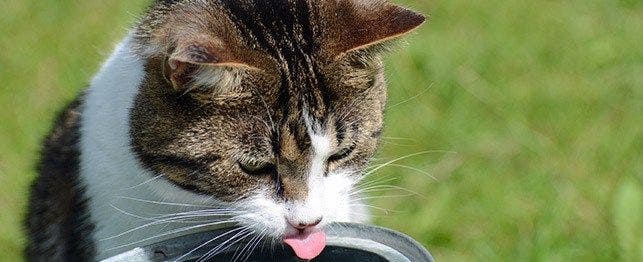
How Much Water Do Cats Need to Stay Healthy?
“Thousands have lived without love, not one without water.” W. H. Auden
As Auden alluded, water is the basic stuff of life. Living creatures, like young kittens, may go for some considerable time between meals, but not between drinks. Do you know how much water cats need daily?
Like us, feline bodies are comprised mainly of water. For an 8-week-old kitten, it can be as much as 75 percent water. Nothing in the body goes anywhere without water. As little as a 10-15 percent reduction in your cat’s total body water can result in death.
The water your cat is made of doesn’t just sit there in a static pool either. It is constantly lost and replenished resulting in a dynamic status quo. Cats lose water through a few ways, the first mainly being through urine. Cat’s also lose water from evaporation from the lungs, the skin, and the digestive tract.
On the other hand, cats take in water primarily through eating and drinking. In order for there to be an even flow between the two bodily processes, there has to be a balance, and this is what keeps your cat healthy. Understanding this process is a main way to answering the question — how much water do cats need?
If your cat is losing more than she’s taking in, she runs the risk of getting dehydrated. Although rare, if your cat takes in too much water she can become over-hydrated.
How Much Water Do Cats Need? Take a Look at Your Cat’s Age and Size
In order to ensure that water intake is not compromised, clean fresh water should be available for kittens 24/7. There is never an excuse not to have water around. When a kitten is scheduled for surgery, do not withhold water from the night before even if called for by an outmoded protocol. Water should be available to the kitten until an hour or two before the procedure to avoid dehydration and increased anesthetic risk. During surgery, the veterinarian may hydrate the kitten by means of intravenous or subcutaneous fluid administration. The kitten should also be observed to make sure it resumes drinking shortly after the procedure.
How much water cats need to stay healthy depends is significantly affected by what they’re eating. The actual volume of water the kitten needs to take in, in the form of free water, depends on whether it is eating dry food or wet food. With dry food, the water intake will be at the higher end of the range indicated above. However, wet food contains 75% water (approximately) so an amount closer to the low end of the scale may be more appropriate. Internal mechanisms closely regulate kittens’ water intake — unless they are sick. If problems of water consumption become apparent (too little or too much), contact your veterinarian immediately.
On the output side, a kitten’s continuous production of urine means that it is being properly hydrated. One of the first things to happen when there’s not enough urine around is that anti-diuretic hormone (ADH) is secreted by the pituitary gland, reducing urine production to a very low level. Under these circumstances, the urine produced is very concentrated, and has to be to remove waste products without wasting too much precious water. Though this compensatory mechanism exists, it is better not to put it to the test with a young kitten. Insensible loss continues unabated and cannot be curtailed in the same way.
Loss of water from the lungs occurs during the process of breathing, as a result of evaporation of water from the lung lining. Evaporative cooling that occurs during this process is one of the ways kittens increase heat loss from their bodies. If a kitten becomes overheated, it will breathe more quickly, or even pant, to increase evaporative heat loss — but note, water is lost from the lungs during this process. Increased water loss in this way requires that water intake increases in compensation, if urine output is to remain uncompromised. So, if it is hot outside, it is even more important to make sure that your kitten has a constant supply of water.
Shortage of water, or uncompensated or excessive loss of water as occurs in heat stroke and some metabolic disorders, will rapidly cause dehydration and a kitten’s premature demise, if unattended. Making sure that your cat always has fresh water is the best way to keep her safe. If you do this consistently, you’ll never have to worry if your cat is hydrated enough to remain healthy.
Are you pet crazy? Sign up for our email newsletter and get the latest health and wellness info, useful tips, product recalls, fun stuff, and so much more!